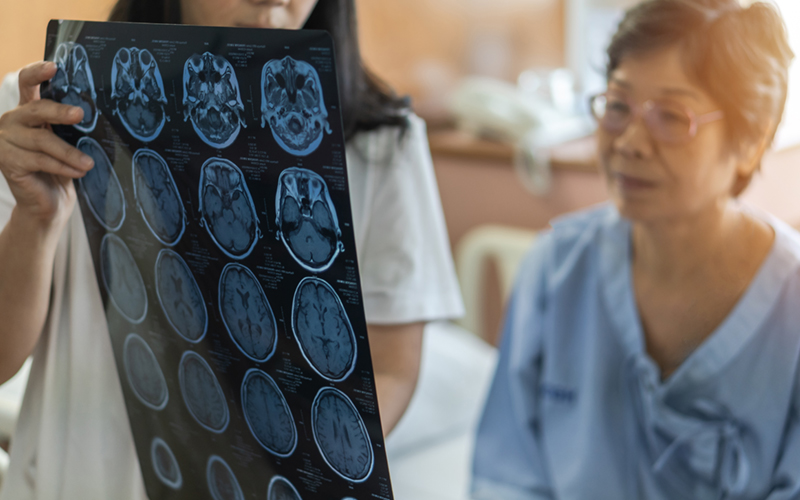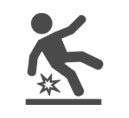Valley Center Brain Injury Attorneys
- 550+ Google 5-Star Reviews
- $1 Billion won over 15 years
- Won’t settle for low offers, not afraid to fight for max value

Get a Free Case Evaluation
No fees until we win!
All San Diego Case Types

Personal Injury

Brain Injury

Car Accident

Slip & Fall

Truck Accident

Wrongful Death
Valley Center Brain Injury Attorneys
Recently, a 55-year-old pedestrian suffered a brain bleed and facial fractures after she and three others were struck by a car on Sports Arena Boulevard minutes after a San Diego Gulls hockey game as they crossed the street in an area not marked by a crosswalk. The driver of the 2000 Ford Mustang fled the scene but was apprehended about four miles later on Shelter Island. He remained in custody the following day in lieu of $50,000 bail. The other two pedestrians who were walking with the woman also suffered injuries. All three were transported to the hospital.
A brain bleed is another word for a brain hemorrhage. This condition is also known as cerebral edema and it occurs when the brain has incurred trauma and there is localized bleeding from burst blood vessels in the damaged area. The blood, which pools on the brain, causes further damage by killing brain cells in the area where it pools.
Valley Center, though in the same region as the sports arena where the accident occurred, may seem like it is worlds away from the city’s hustle and bustle and the dangers of its traffic. However, brain injuries can occur in many ways and they can happen anywhere. If you suffered a brain injury due to an accident in Valley Center that was the result of someone’s carelessness or recklessness, you may be eligible to pursue compensation through a personal injury lawsuit. An experienced California brain injury attorney at Gomez Trial Attorneys can help you understand this process.

Understanding Brain Injuries in Valley Center
Traumatic brain injuries (TBI) are a major source of death and disability in the United States, reports the Centers for Disease Control and Prevention. Defined as a result of a violent jolt or blow to the head, around 155 people die each day due to injuries that include TBI, with survivors of this type of injuries grappling for their life and their ability to function anywhere from a few days to the rest of their life. More than 2 million TBI-related visits to emergency room departments occur each year, including more than 800,000 children. More than 200,000 hospitalizations to treat individuals with brain injuries result.
Falls are the leading cause of brain injuries, accounting for 52 percent of all injuries of this type that require a visit to the emergency room department. Almost half of all of the TBI-related emergency room department visits among children 17 years old or younger were the result of falls, along with 81 percent of the emergency department visits by brain-injured adults over the age of 65. The second-most leading cause of brain injuries is motor vehicle accidents, which account for about 20 percent of all cases. Motor vehicle accidents are the leading cause of TBIs in individuals age 15 to 44.
Other common causes include:
- Being struck by or against an object
- Violence, including assault, self-harm, and combat-related causes such as blast injuries
- Sports-related activities
Brain injuries are categorized according to severity as mild, moderate, or severe. Regardless of how they’re classified, TBIs can produce vomiting, dizziness, lethargy, memory loss, unconsciousness, contusions or bleeding, even comas or death. Injuries do not always appear on neuroimaging tests such as MRIs or CTs.
Concussions, though considered mild, may result in long-lasting impacts on memory, as well as chronic complications. These complications from concussions—which are the most common form of TBI—are often more severe in those who have suffered repeated brain trauma, including athletes and those serving in combat military operations. The treatment of concussions accounts for approximately 81 percent of the medical costs to the nation for brain injury treatment.
Those with moderate or severe brain injuries typically suffer permanent damage to the portion of the brain that is injured due to brain cell death. The deficits that result from this damage depend on the side of the brain in which the injury occurred, as well as the region. Left side brain injuries often result in the inability to control movement on the right side of the body, as well as difficulty understanding language and speaking, depression or anxiety, impaired logic, and sequencing difficulties. Right side brain injuries tend to result in an inability to control movement on the left side of the body, as well as decreased awareness of deficits, visual memory deficits, and loss of “big picture” type thinking.
Parts of the Brain and Effects
The brain contains several regions, or lobes. The deficits one endures due to a brain injury are also dependent on the lobe that suffered damage. A brief look at the type of deficits or symptoms one might experience by lobe include:
- Frontal: Frontal lobe injuries commonly result in difficulty with controlling behavior, emotions, or impulses, as well as difficulty speaking and memory loss.
- Temporal: Damage to the temporal lobe may produce deficits such as difficulty with communication or memory.
- Occipital: As the occipital lobe controls vision, those with injuries to this part of the brain may have difficulty seeing or perceiving the size and shape of objects.
- Parietal: Injuries occurring to the parietal lobe may involve damage to the five primary senses of sight, smell, taste, hearing, and sensation.
- Cerebellum: Injuries to the cerebellum may produce profound deficits to balance, movement, and coordination.
- Brain stem: Those suffering brain stem injuries cannot always perform involuntary responses such as breathing, coughing, heart rate, and consciousness. The inability to perform involuntary responses may result in death or the need for life support through mechanical measures.
Brain injuries are diagnosed through an evaluation in which the Glasgow Coma Scale may be used. This is an assessment that evaluates the severity of the injury through tests designed to solicit responses such as body movement, opening of the eyes, and verbal responses. Based on these responses, physicians are better able to tell if the injury is mild, moderate, or severe. They will perform other assessments to detect small, gradual improvements in an individual’s condition after suffering a brain injury, as well as to evaluate brain injury-related deficits such as post-traumatic amnesia. Neuroimaging tests are also relied on to give doctors a more complete look at the injury that has been sustained.
Severe TBIs often produce complications that can result in further damage or even death if the individual is not actively monitored in the early days and weeks following the injury. Some of these complications may include:
- Altered consciousness, including coma, which is a period of time in which an individual is completely unconscious and cannot respond to stimuli; a vegetative state, in which a person remains unaware of his or her surroundings but may open the eyes, make sounds, respond to reflexes, and move; minimally conscious state in which an individual’s consciousness is still altered but he or she shows signs of some awareness and response to stimuli; or brain death, an irreversible condition in which there is no longer any activity in the brain or brain stem.
- Post-traumatic epilepsy, which is seizures suffered by the brain injured individual that may occur early in the recovery process or even several years after the injury occurred.
- Hydrocephalus, which is fluid buildup on the brain that may require surgery to relieve the pressure that this buildup creates.
- Infections from penetrating injuries to the skull that result in bacteria being introduced into the meninges, which is the protective layer covering the brain. This infection can spread to the body and can be fatal.
- Damage to the blood vessels in the brain that could result in a stroke or blood clot. Clots may also form in the deep veins of the arms or legs, placing the individual at risk of a pulmonary embolism.
- Headaches, which are a common complication of brain injury, often severe in nature and lasting for several months.
- Vertigo (dizziness), which can be intermittent and long lasting following an injury to the brain.
- Damage to the cranial nerves that may cause altered sense of smell or taste, paralysis of the facial muscles, hearing loss, and difficulty swallowing.
- Spasticity, which is extreme, rigid muscle tightness that results in pain and impairs movement.
- Brain Hemorrhages, Which is when an artery bursts, causing a stroke like situation.
- Degenerative brain diseases, such as Alzheimer’s disease or Parkinson’s disease.
The Outlook for a Brain Injured Person
Brain injuries can damage every facet of the person’s life, including:
- Work: Because the brain injury may produce physical, cognitive, or behavioral deficits, many brain injured individuals cannot return to the job they held before the injury occurred. In fact, many cannot work at all after suffering a brain injury. An estimated 60 percent of brain injured adults remain unemployed two years after the injury, as compared to around 5 percent of the uninjured population that is unemployed. For those who can perform some type of work, many require vocational rehabilitation.
- Home: An individual recovering from a brain injury who can return home may require extensive modifications to accommodate their physical limitations after the injury. Some of these modifications may include widened doors, wheelchair ramps, stair lifts, roll-in showers, and door openers.
- Relationships: A brain injured person’s relationships with family members and friends often change dramatically following the injury. A spouse who once relied on the individual for companionship and support might now find themselves serving as a caretaker, tasked with assisting the injured person with basic daily needs such as feeding or toileting. The couple’s sexual relationship may also suffer as the hormonal changes the body undergoes due to the injury can alter his or her sex drive, as can body image after the injury and sexual preferences. Children whose parents suffer a brain injury may grieve the loss of the parent they knew and may also be placed in a caretaker role. Friends may find that they no longer have anything in common with the injured person, and the injured person may not participate in recreational or community activities that he or she previously enjoyed.
- School: Contrary to popular belief, children don’t necessarily fare better than adults following a brain injury. The full extent of a brain injured child’s deficits may not be realized until years after the injury, as the child’s brain continues to develop. Children with brain injuries often require modifications in schedule, workload, and expectations in the educational system.

Treating a brain injury can result in medical costs of more than $300,000 and—in more severe cases such as those involving a prolonged hospitalization due to consciousness disorders and other complications could result in expenses that range up to $4 million. Because of the enormous financial and emotional strain of coping with this injury, many brain injured individuals find themselves facing life alone.
More than half of all homeless people in the United States have suffered a brain injury, including many U.S. veterans. In the initial treatment of the injury, brain injured individuals must have access to social workers and other resources to provide support and services that can protect the individual and his or her family from becoming overwhelmed by the strain that the injury places on their lives.
Call Our Valley Center Brain Injury Attorneys Today
If you or a loved one suffered a brain injury as the result of someone else’s negligence or deliberate acts, there may be compensation available for many of the expenses you face, including medical expenses, loss of income and future earning capacity, and the psychological and emotional costs of the injury. Let us help you understand if you’re eligible to pursue this compensation. Contact Gomez Trial Attorneys at (866) 395-6792 or by writing to us online now for a free consultation.
Our Process... Easy as 1. 2. 3!
Call Us
We will determine your case and submit
We get to work
You will get regular update from us
Win
Collect your compensation

550+ 5 Star Reviews
-
“John helped me find doctors, he referred me to his neurologist, his physical therapist, I mean, anything I needed he was right there, every step of the way. I couldn’t have asked for a better result from all of this, I would absolutely recommend Gomez Trial Attorneys.”
-
“During the time I was working with Gomez Trial Attorneys, they treated me very, very well. 100% of the time, they believed me, and they were very compassionate. They felt sorry for what happened and they understood the therapy process.”
-
“They held my hand the whole time and kept me in the loop every aspect of my case which was very refreshing to me. They helped me get my settlement offer as fast as possible and I was able to keep my farm”
-
“The Gomez experience was the best experience it could be for me really, only positive things to say. They really were there every step if the way. Thanks to Gomez Trial Attorneys my dad is able to support my family as a single father”
-
“He opened the door for me to join his firm to help other brain Injury survivors and I never met another firm who is like this who was so understanding and caring who took the extra step and walked the extra mile with their clients and this is the best”
-
“I am very satisfied with the outcome with Gomez and I would definitely recommend Gomez to anybody, we tell people all the time, Get Gomez! They are really thorough with everything and they make you feel real comfortable.”
-
“Just helped us through, guided us through, I kept notes all those years, we had questions all the time and they would always keep us informed of what was going on. They just unlayered it, layer by layer, I’ve never seen anything like them. Thank God for them.”

